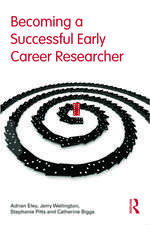Social Media in Academia: Networked Scholars
Autor George Veletsianosen Limba Engleză Paperback – 12 ian 2016
| Toate formatele și edițiile | Preț | Express |
|---|---|---|
| Paperback (1) | 392.11 lei 43-57 zile | |
| Taylor & Francis – 12 ian 2016 | 392.11 lei 43-57 zile | |
| Hardback (1) | 1160.32 lei 43-57 zile | |
| Taylor & Francis – 4 ian 2016 | 1160.32 lei 43-57 zile |
Preț: 392.11 lei
Nou
Puncte Express: 588
Preț estimativ în valută:
75.05€ • 81.55$ • 63.09£
75.05€ • 81.55$ • 63.09£
Carte tipărită la comandă
Livrare economică 21 aprilie-05 mai
Preluare comenzi: 021 569.72.76
Specificații
ISBN-13: 9781138822757
ISBN-10: 1138822752
Pagini: 140
Ilustrații: 6 black & white illustrations, 1 black & white tables
Dimensiuni: 152 x 229 x 13 mm
Greutate: 0.2 kg
Ediția:1
Editura: Taylor & Francis
Colecția Routledge
Locul publicării:Oxford, United Kingdom
ISBN-10: 1138822752
Pagini: 140
Ilustrații: 6 black & white illustrations, 1 black & white tables
Dimensiuni: 152 x 229 x 13 mm
Greutate: 0.2 kg
Ediția:1
Editura: Taylor & Francis
Colecția Routledge
Locul publicării:Oxford, United Kingdom
Public țintă
Adult education, Postgraduate, and UndergraduateCuprins
Acknowledgements
Index
- Introduction
- Networked Scholarship
- Anna: A Social Media Advocate
- Networks of Knowledge Creation and Dissemination
- Jaime: The Complicated Realities of Day-to-Day Social Media Use
- Networks of Tension and Conflict
- Nicholas: A Visitor
- Networks of Inequity
- Networks of Disclosure
- Fragmented Networks
- Scholarly Networks or, Scholars in Networks?
- Conclusion
Index
Recenzii
"A timely and significant contribution to the field. Many books tend to take either an advocacy stance or dystopian view of technology in scholarship, but Veletsianos manages to take a critical perspective that is both grounded in theory and rooted in practical experience. For any academic interested in the impact of networked technology on teaching or research, this is highly recommended."
--Martin Weller, Professor of Educational Technology at the Open University, UK
"Social Media in Academia is one of those rare books that every new assistant professor and doctoral student should read and take to heart. Establishing one's public profile through networked scholarship is not a task to be undertaken casually, but one that requires mindfulness and discernment. Veletsianos provides invaluable guidance that all academics, but especially those just starting out, should heed."
--Thomas C. Reeves, Professor Emeritus of Learning, Design, and Technology at the University of Georgia, USA
--Martin Weller, Professor of Educational Technology at the Open University, UK
"Social Media in Academia is one of those rare books that every new assistant professor and doctoral student should read and take to heart. Establishing one's public profile through networked scholarship is not a task to be undertaken casually, but one that requires mindfulness and discernment. Veletsianos provides invaluable guidance that all academics, but especially those just starting out, should heed."
--Thomas C. Reeves, Professor Emeritus of Learning, Design, and Technology at the University of Georgia, USA
Notă biografică
George Veletsianos is Canada Research Chair of Innovative Learning and Technology and Associate Professor at Royal Roads University in Victoria, British Columbia, Canada. He has been developing and researching digital learning environments since 2004.
Descriere
Social media and online social networks are expected to transform academia and the scholarly process. However, intense emotions permeate scholars’ online practices and an increasing number of academics are finding themselves in trouble in networked spaces. In reality, the evidence describing scholars’ experiences in online social networks and social media is fragmented. As a result, the ways that social media are used and experienced by scholars are not well understood. Social Media in Academia examines the day-to-day realities of social media and online networks for scholarship and illuminates the opportunities, tensions, conflicts, and inequities that exist in these spaces. The book concludes with suggestions for institutions, individual scholars, and doctoral students regarding online participation, social media, networked practice, and public scholarship.










